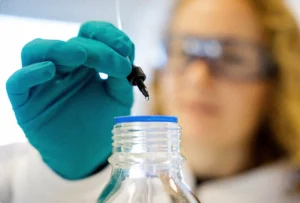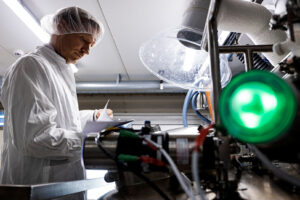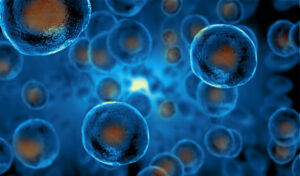
TrypsiNNex®
Reduce resources needed for validation, improve process consistency and reduce costs due to contamination risk with our animal-free, recombinant TrypsiNNex®.
The animal-free, recombinant TrypsiNNex® sequence is identical to porcine Trypsin and can be used as a direct replacement when converting to animal-free manufacturing. TrypsiNNex® is expressed in E. coli as an inactive product. The trypsin remains inactivated during both the upstream and downstream manufacturing process, minimizing the level of auto degradation before final stabilization and packaging, thereby preserving a high content of β-trypsin.
Trypsin has intrinsic autolytic activity and is degraded in steps, where β-trypsin is converted into α-trypsin through proteolytic cleavage (red scissors).
This process continues until the trypsin is inactivated. Intermediate forms such as Ψ-trypsin display unspecific activity, which is undesirable. Thus, a high β-trypsin content is a quality indicator that ensures consistent activity and high specificity.
TrypsiNNex® has a measured β-trypsin of typically well above the minimum specifications at 70% ensuring a high activity and consistent proteolytic pattern, which is critical when processing precursor proteins, such as pro-insulin.
TrypsiNNex® is GMP manufactured in accordance with IPEC’s guideline “The Joint Good Manufacturing Practices Guide for Pharmaceutical excipients” (2017) and applicable chapters in pharmacopoeias and ICH guidelines.
Enzymatic activity*: >333.000 USP units/ml
Product purity : ≥ 90 % (α- and β-trypsin)
β-trypsin content: ≥ 70%
Protein content: 55-85 mg/mL
Formulation: 10 mM HCl, 20 mM CaCl2
Bioburden (Microbial Count): ≤ 10 CFU/mL
Stability: 36 months at –20ºC ±5ºC
*Alternative units / USP units
1 Chromozym TRY Unit: 21 USP Units
Storage and transportation
TrypsiNNex® is shipped on dry ice.
TrypsiNNex® should be stored at ‑20°C ±5ºC immediately upon arrival.
Please contact us for information on storage and handling after dilution.
Trypsin inhibitors
If trypsin inhibitors are needed, these may be possible to use:
Trypsin Detection
In Biopharmaceutical production, detection of raw material is necessary:
For support on incoming quality testing, please contact us.
Although there are no specific regulatory guidelines at this time to specify allowable amounts of residual Trypsin or Collagenase, these are still considered process residuals and potential product contaminants, and thus should be assessed as part of an overall risk mitigation strategy.

Reduce resources needed for validation, improve process consistency and reduce costs due to contamination risk with our animal-free, recombinant TrypsiNNex®.


TrypsiNNex® specifically addresses the need for a consistent, high-purity and high-quality enzyme in biopharmaceutical manufacturing.
Københavnsvej 216
4600 Køge,
Denmark
+45 5667 1000
[email protected]
CVR-no. 13246149